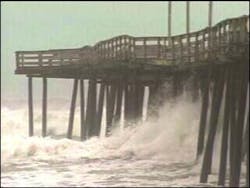Isabel Hammers North Carolina, Knocking Out Power
ATLANTIC BEACH, N.C. (AP) -- The outer bands of a weakened but still potent Hurricane Isabel lashed the North Carolina coast with screaming wind and heavy rain Thursday, knocking out power for thousands of customers.
Forecasters said Isabel was expected to maintain its status as a hurricane for about 24 hours after landfall. It was expected to move north across North Carolina and Virginia and then take a path through western Pennsylvania and western New York state before dissipating in Canada by Saturday.
Isabel's top sustained wind had eased to 100 mph, making it a borderline Category 1 or Category 2, said Ed Rappaport, deputy director of the National Hurricane Center in Miami.
The decreased wind lowered the storm surge potential to 5 to 8 feet, from the previous forecast of up to 11 feet, Rappaport said.
``That still poses a significant danger along the coastline,'' he said.
He said the heart of the storm could hit land around noon between Morehead City, N.C., and Cape Hatteras, N.C. High tide is in early afternoon.
A hurricane warning was in effect from Cape Fear in southern North Carolina to the Virginia-Maryland line. A tropical storm warning extended northward to New York's Long Island, including parts of New York City.
At 8 a.m. EDT, Isabel was about 110 miles south-southeast of North Carolina's Cape Hatteras. It had picked up speed, moving northwest at around 15 mph. It's expected to stay at a similar strength as it moves closer to land and could spawn isolated tornadoes in eastern North Carolina and southeastern Virginia.
In the nation's capital, federal and district offices were ordered closed, and Congress canceled votes so members could return home. Amtrak canceled all service south of Washington.
Up to a foot of rain was possible in West Virginia's hilly Eastern Panhandle and 6 to 9 inches of rain was forecast for parts of Pennsylvania.
Governors of West Virginia, Maryland, Virginia, North Carolina and Delaware had declared states of emergency.
Pennsylvania officials said the ground is so sodden that it would take as little as 2 to 4 inches of rain to cause rivers and creeks to spill their banks.
Most of the barrier islands were nearly empty early Thursday as rain flew at a 45-degree angle, driven by 60 mph wind gusts that turned sand grains into darts and howled like jet engines.
``It's like a sand blaster. You need a face shield,'' said Nick McClintock, a pipefitter who used his welding mask to glimpse the 15-foot waves whipping the surf frothy white at Nags Head.
Seas up to 33 feet had been reported off the Virginia coast, said Ken Reeves, senior meteorologist at AccuWeather Inc., the weather forecasting company based at State College, Pa.
At least 131,000 customers had lost power by midmorning, including 110,000 in the Virginia Beach area and more than 20,000 along the North Carolina coast, said Dominion Power.
More than 300,000 people in North Carolina and Virginia had been urged to move to higher ground. Even seasoned storm veterans succumbed to the five days of warnings that started when Isabel was a Category 5 leviathan with 160 mph wind.
But a few thousand hardy _ or foolhardy _ souls ignored mandatory evacuation orders and remained behind. Virginia Beach police suggested they write their names in permanent marker on their forearms so they can be identified if they are injured or killed.
At Howard's Pub on isolated Ocracoke Island, bartender James Tucker said he and five other employees resolved early Thursday to ``hang out and drink beer until the cable runs out.''
The tourists, he said, were all gone. That's good, said the 13-year-island-resident: Rookies tend to get scared.
John and Rita Razze's home in Chadds Ford, Pa., was flooded with several inches of water when rain earlier this week caused the nearby Brandywine River to overflow. Now, with everything pumped out and cleaned up, John Razze worried that the ground would be unable to absorb any of Isabel's rain.
``Usually we stay here and wait it out,'' said Razze, who left work early Wednesday to move anything he could carry to the second floor. ``This time, we're going to get the heck out of here.''
At historic Jamestown, Va., archaeologists blanketed a dig of the first permanent English settlement in America with a tarp and anchored it with sandbags. More than 500,000 artifacts from Jamestown Island are stored in a storm-proof vault.
In Kill Devil Hills, N.C., museum curators prepared to move artifacts and photographs collected for the centennial celebration of the Wright brothers' first flight.
Related:
